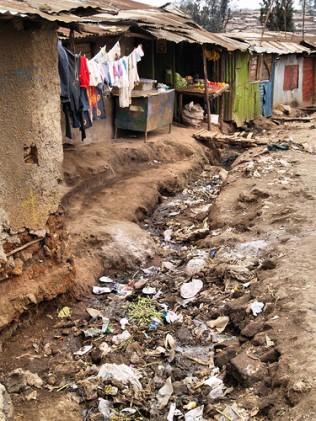
With no formal waste management system, the trash in Kenya’s crowded Kibera slum piles up in the dirt rows between shacks, in open pits and on people’s doorsteps: plastic bags, raw sewage, egg shells, the scraps of people’s lives. As slum residents, aid workers and tourists on “poverty tours”—a controversial idea in itself—know all too well, garbage in East Africa’s largest slum poses a critical health threat.
That’s why a grassroots project claiming to turn all of that trash into an environmentally friendly fuel source for cooking and hot water sounds good—too good to be true, some experts fear.
The Community Cooker Project is a simple idea aimed at solving several of the slum’s humanitarian problems. The project collects waste from Kibera residents, sorts it so that some heavier metals and plastics can be sold, and then burns the rest in an incinerator combining recycled motor oil and water to achieve temperatures of around 800∞C in its combustion box. The energy is then used to heat water for a community cooker and hot showers. The trash-fueled cooker creates jobs, relieves the garbage problem and provides an alternative cooking fuel to charcoal—a major cause of deforestation.
The cooker has been lauded for its creative approach to energy use and waste management, including being shortlisted for the 2008 World Architecture Festival Award in the Energy, Waste, and Recycling category. However, Neil Tangri, an energy expert and media spokesman for the Global Anti-Incinerator Alliance (GAIA), has doubts about the system. Although he praises the cooker project’s good intentions, Tangri points out that “there is no screening of toxics, no emissions controls” and that burning mixed wastes produces everything from lung-damaging dioxins to major climate-change offenders like polychlorinated biphenyls (PCBs). “Crude burners like the Kibera cooker are particularly notorious for producing large quantities of particulate matter…which can pass through the lungs and enter the bloodstream,” Tangri notes. This is even more of a problem when items like plastic bottles and bags are thrown into the incinerator—they create particulates carrying arsenic, mercury, lead and other heavy metals. While no health or environmental studies have been conducted on the Kibera cooker, researchers at the University of Nigeria studying a similar project found that its emissions rates for carbon monoxide were 50 times higher than the standard set by the Nigerian Federal Environmental Protection Agency.
Despite these possible environmental and health concerns, the United Nations Environment Programme (UNEP) wrote in their Kenyan newsletter that the community cooker “is an ideal item for densely populated areas like slums and refugee camps.” Along with the Kenyan Red Cross, UNEP is preparing to build more community cookers across the country. UNEP does recognize that more testing needs to be done to raise the incinerator temperature to destroy carcinogens, yet even multimillion-dollar, high-temperature trash-to-energy incinerators have come under fire for their emissions records.
Given these potential health hazards, Tangri prefers to promote a different option. Solar ovens can solve the charcoal problem without all the nasty emissions, while poor communities from Indonesia to India are successfully implementing creative waste management and recycling programs. Environmental groups such as GAIA and Friends of the Earth agree that recycling, composting and bio-gas are all more energy efficient, ecologically sound and economically viable than trash-to-fuel projects like Kibera’s community cooker. Kibera desperately needs passionate, dedicated people like those running the Community Cooker Project. “The goals seem entirely laudable,” Tangri says. However, he believes “it would be a pity if the Kibera cooker precluded safer, better alternatives.”
Read Ethical Traveler's Reprint Policy.
